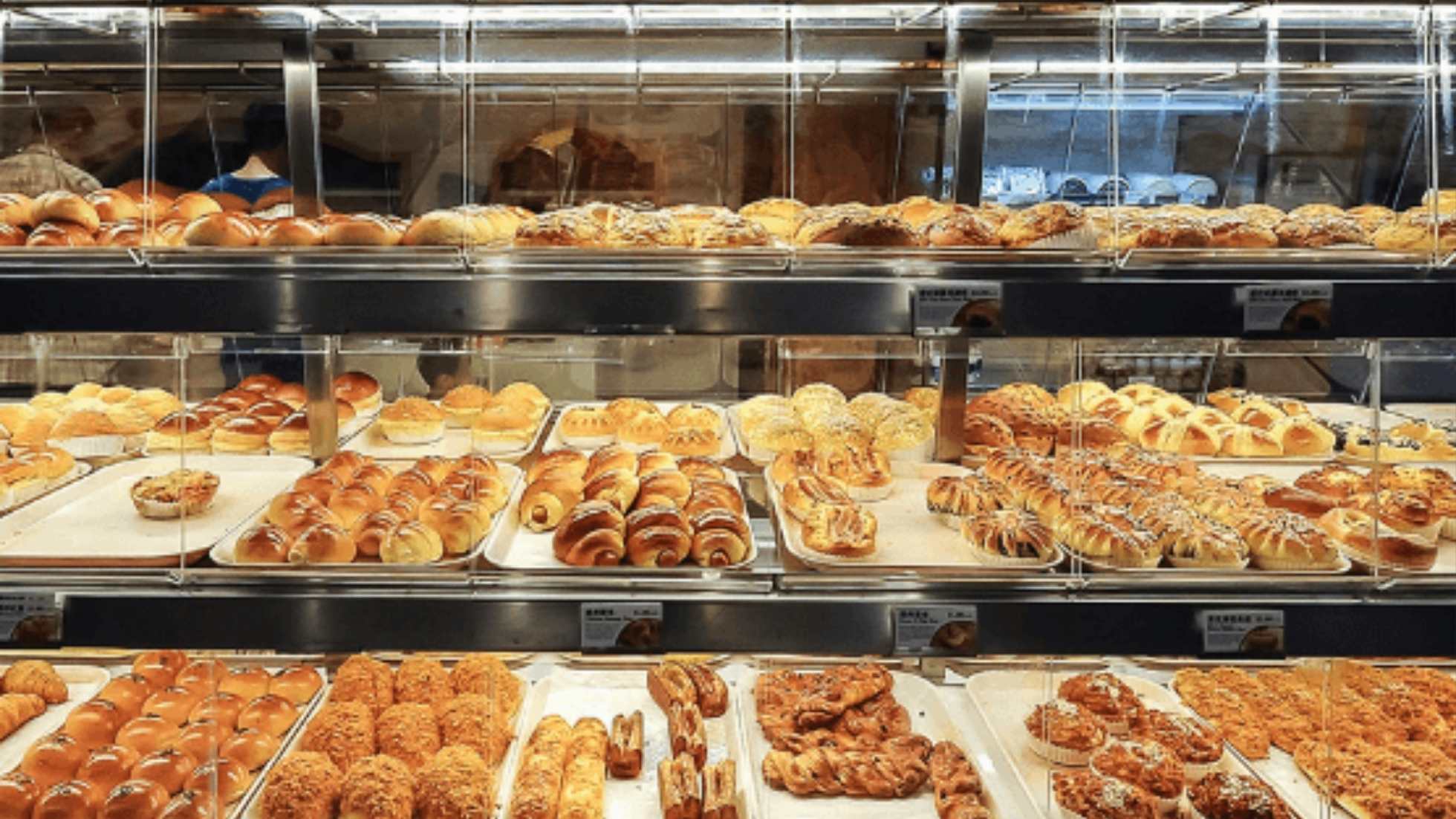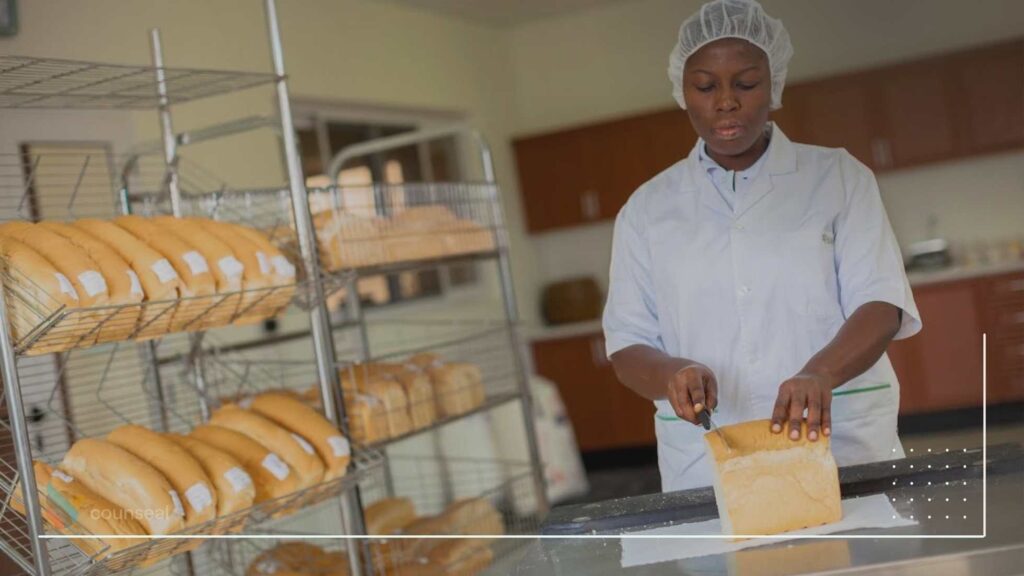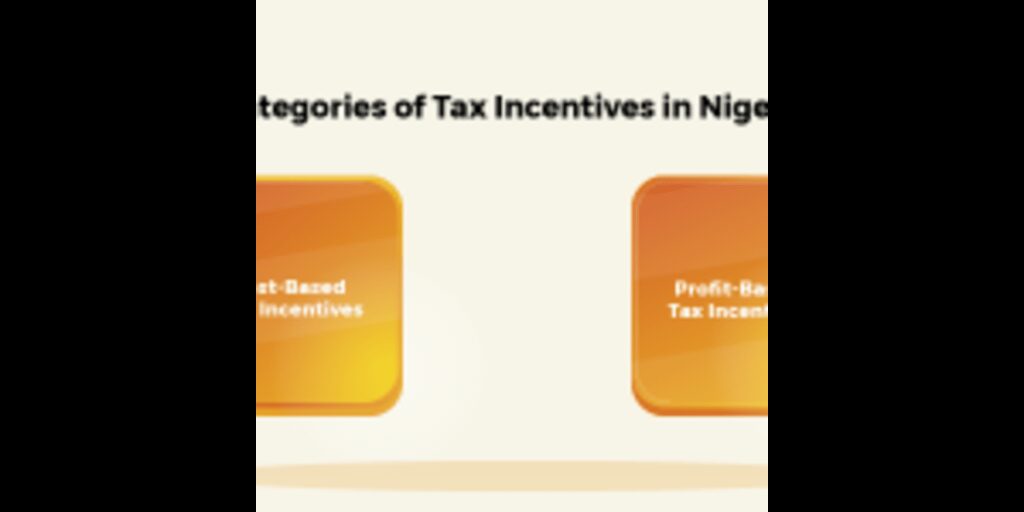A Guide on How to Start your Dream Bakery Business in Nigeria

by Counseal Team
Updated March 15, 2025

So, you’re considering launching a bakery business in Nigeria? Excellent choice, my friend.
Nigeria’s love for baked goods, especially bread, cakes, and pastries, is strong and the market is ripe for the taking. Now, starting a bakery business isn’t as simple as baking a cake and selling it. There are various steps you need to follow.
Are you ready to dive in?
This article is your comprehensive guide to starting a successful bakery business in Nigeria.
Let’s get started, shall we?
- Quick Takes
- Navigating the Nigerian Business Terrain
- Why Market Research and Planning Are Non-negotiable
- Navigating the Maze of Location and Equipment Selection
- Equipping Your Bakery Business Right
- Why Licences and Permits are Non-Negotiable
- Why Staff Are Essential for Your Bakery Business
- Supercharge Your Bakery Sales with Effective Marketing and Promotion
- Final Thoughts
- Frequently Asked Questions
Quick Takes
How much does it cost to start this business?
The cost of starting a bakery business in Nigeria varies depending on the size and type of bakery. The factors that affect the cost are the location, equipment, materials, staff, and registration. Based on the information from the sources, here are estimates of the cost of starting a bakery business in Nigeria:
- A small bakery that produces bread, cakes, and pastries cost between ₦100,000 and ₦500,000.
- A medium-sized bakery that has more equipment and staff costs between ₦500,000 and ₦700,000.
- A large-scale bakery that operates as a factory costs between ₦6 million and ₦10 million.
These are only rough estimates and the cost varies depending on the market situation and the specific needs of the business. It is advisable to do a feasibility study and a business plan before starting a bakery business in Nigeria.
How much can you make per month?
The amount of money you make per month from a bakery business in Nigeria depends on factors, such as:
- the size and type of your bakery,
- the quality and variety of your products,
- the location and demand of your market,
- the cost of production and operation, and
- the level of competition.
However, based on research, here are some scenarios of how much you can make per month from a bakery business in Nigeria:
- If you have a small bakery that produces bread, cakes, and pastries, and you sell an average of 500 loaves of bread per day at ₦200 each, you can make a gross revenue of ₦100,000 per day or ₦3 million per month1. Assuming your cost of production is 50% of your revenue, you can make a net profit of ₦50,000 per day or ₦1.5 million per month.
- If you have a medium-sized bakery that has more equipment and staff, and you sell an average of 1000 loaves of bread per day at ₦250 each, you can make a gross revenue of ₦250,000 per day or ₦7.5 million per month. Assuming your cost of production is 40% of your revenue, you can make a net profit of ₦150,000 per day or ₦4.5 million per month.
- If you have a large-scale bakery that operates as a factory, and you sell an average of 5000 loaves of bread per day at ₦300 each, you can make a gross revenue of ₦1.5 million per day or ₦45 million per month. Assuming your cost of production is 30% of your revenue, you can make a net profit of ₦1.05 million per day or ₦31.5 million per month.
These are only hypothetical examples and the actual figures may vary depending on the market situation and the specific details of your business. It is advisable to do a feasibility study and a business plan before starting a bakery business in Nigeria.
What is the minimum required to start this business?
The minimum amount of money required to start a bakery business in Nigeria depends on the size and type of bakery you want to start. Here are common expenses that you need to consider:
- Registration: You need to register your bakery business with the Corporate Affairs Commission (CAC) and get a business name certificate. The cost of registration varies depending on the type of business entity, but it ranges from ₦10,000 to ₦50,000. You also need to get other permits and licences from the National Agency for Food and Drug Administration and Control (NAFDAC), the Standard Organisation of Nigeria (SON), and the local government authorities. The cost of these permits and licences varies depending on the location and size of your bakery, but it ranges from ₦50,000 to ₦200,000.
- Equipment: You need to purchase or lease the equipment for your bakery, such as ovens, mixers, slicers, proofers, tables, racks, trays, pans, scales, thermometers, etc. The cost of equipment depends on the quality and quantity of the equipment, but it ranges from ₦100,000 to ₦5 million.
- Materials: You need to buy the raw materials for your bakery, such as flour, sugar, yeast, butter, eggs, milk, etc. The cost of materials depends on the quantity and quality of the materials, but it ranges from ₦50,000 to ₦500,000 per month.
- Staff: You need to hire and pay the staff for your bakery, such as bakers, packers, cleaners, salespersons, etc. The cost of staff depends on the number and skill of the staff, but it ranges from ₦50,000 to ₦500,000 per month.
- Rent: You need to rent or buy a suitable space for your bakery, preferably in a busy and accessible area. The cost of rent depends on the location and size of the space, but it ranges from ₦50,000 to ₦500,000 per month.
- Utilities: You need to pay for the utilities for your bakery, such as electricity, water, gas, internet, etc. The cost of utilities depends on the consumption and availability of the utilities, but it ranges from ₦20,000 to ₦200,000 per month.
- Marketing: You need to market your bakery business to attract and keep customers, such as printing flyers, banners, business cards, etc. The cost of marketing depends on the strategy and frequency of the marketing, but it ranges from ₦10,000 to ₦100,000 per month.
These are only rough estimates and the actual cost depends on the market situation and the specific needs of your business. It is advisable to do a feasibility study and a business plan before starting a bakery business in Nigeria.
What are the best states to start this business?
The best states in Nigeria to start a bakery business are those that have a high population, a high demand for baked products, low competition, and a favourable business environment. Based on these criteria, the best states in Nigeria to start a bakery business are:
- Lagos: Lagos is the most populous and commercial state in Nigeria, with over 20 million people and a vibrant economy. Lagos has a vast market for bread and other baked products, as people consume them as breakfast, snacks, or gifts. Lagos also has a diverse and cosmopolitan population, so there is a demand for different baked products, such as cakes, pastries, cookies, etc. Lagos also has a good infrastructure and a relatively stable power supply, which are essential for running a bakery business.
- Abuja: Abuja is the capital and administrative state of Nigeria, with over 3 million people and a high standard of living. Abuja has a high demand for bread and other baked products, as people in the city are busy and prefer convenient and fast meals. Abuja also has government workers, diplomats, expatriates, and tourists, who have a taste for quality and variety in baked products. Abuja also has a good infrastructure and a relatively stable power supply, which are essential for running a bakery business.
Despite the favourability of these two states, they share common challenges that you should note, such as:
- high cost of rent,
- high cost of raw materials,
- high traffic congestion, and
- top competition from other bakeries.
To succeed in Lagos and Abuja, you must possess a unique selling proposition, a prime location, a solid marketing strategy, and a devoted customer base
- Kano: Kano is the most populous and commercial state in northern Nigeria, with over 13 million people and a strong agricultural sector. Kano has a high demand for bread and other baked products, as people in the state consume them as part of their daily diet. Kano also has traders, farmers, artisans, and students who have a need for affordable and nutritious baked products. Kano also has a good road network and a relatively low cost of rent, which are beneficial for running a bakery business. However, Kano also has challenges, such as low power supply, low security, low literacy, and low income. Therefore, to succeed in Kano, you need to have a low-cost product, a good distribution channel, a good hygiene standard, and a good social responsibility.
What are the known examples of this business?
Some of the known examples of bakery business in Nigeria are:
- FEGEOSTOM: This is a bakery that produces bread and other baked products such as cakes, pastries, pies and in Osogbo, Osun State. It also offers apprenticeship training and consultancy in the industry.
- Graceco: This is a large-scale bakery that operates as a factory in Alagbado, Lagos State. It produces bread, cakes, snacks, and confectioneries. It also provides catering services and training for aspiring bakers.
- Nuts About Cakes: This is a specialty bakery that focuses on cakes and cupcakes for various occasions, such as weddings, birthdays, anniversaries, and corporate events. It has branches in Lekki, Ikoyi, and Ikeja in Lagos State. It also offers cake decorating classes and online delivery services.
- Big Treat: This is a bakery that offers a variety of bread, cakes, pastries, and desserts. It has outlets in Victoria Island, Surulere, Ogba, and Festac in Lagos State. It also has a catering arm that provides food and drinks for events.
- Delightful Affairs: This is a bakery that specialises in custom-made cakes and desserts for weddings, birthdays, baby showers, and other celebrations. It is in Abuja, the capital city of Nigeria. It also offers cake design courses and online ordering services.
Navigating the Nigerian Business Terrain

With starting a business in Nigeria, it’s not enough to have a brilliant idea. You need to understand the unique dynamics of the Nigerian business environment.
From handling business registration to navigating regulatory issues, there are unique challenges that Nigerian entrepreneurs face.
But let me assure you, it’s not as daunting as it sounds.
With my years of experience in the Nigerian startup scene, I’ve navigated these waters, and I’m here to guide you through them. So, let’s dive in!
Understanding the Business Registration Process
In Nigeria, the Corporate Affairs Commission (CAC) handles business registration. You’ll need to decide on the best structure for your business, whether it’s a sole proprietorship, partnership, or limited liability company.
Each has its pros and cons, with different legal and tax implications.
Here’s a quick tip: for startups, registering as a limited liability company is the best option. It offers the most protection for you as a business owner.
Dealing with Regulatory Issues
Nigeria, like any other country, has regulations that businesses need to adhere to. These regulations vary depending on the industry.
For instance, if you’re in the food industry, you’ll have to deal with NAFDAC (National Agency for Food and Drug Administration and Control).
Remember, compliance with regulations isn’t just about avoiding penalties. It also helps to enhance your reputation and boost customer trust.
Securing Funding
Getting your business off the ground will require funding. In Nigeria, there are several funding options available to entrepreneurs.
These include personal savings, loans from family and friends, angel investors, and even venture capital firms.
Case in point: Flutterwave, a Nigerian FinTech startup, raised $170 million in Series C funding in 2021. So yes, funding is possible if you have a solid business idea and a robust business plan.
Exploring the Nigerian Market
Understanding the Nigerian market is key to your business’s success. With a population of over 200 million, Nigeria is a vast and diverse market.
However, it’s crucial to identify your target market and understand their needs, preferences, and buying behaviours.
For example, a UN report showed that Nigeria has the highest number of entrepreneurs in the world, with 41 million micro, small, and medium-scale enterprises. This makes it a hotspot for B2B startups.
Overcoming Infrastructure Challenges
One of the major challenges of doing business in Nigeria is the state of the infrastructure. Issues like unstable power supplies, poor road networks, and unreliable internet services can be major setbacks.
However, successful businesses have found innovative ways around these challenges.
A classic example is Nigeria’s e-commerce giant, Jumia. Despite the poor road network, they’ve built a robust logistics system that ensures efficient delivery of goods to customers.
Why Market Research and Planning Are Non-negotiable

Let’s face it, launching a bakery business without conducting proper market research and planning is like navigating a ship without a compass. You’ll be sailing blind, and that’s a recipe for disaster.
So, whether you’re dreaming up a bakery that’ll whip up the most delicious cupcakes in Lagos, or you’re envisioning a premium bread shop in Abuja, you need to have the right data and strategy to guide you.
The How-To’s of Market Research and Planning
First things first, you need to identify your target market and customer segments. Who are the people who’ll walk into your bakery, fall in love with your pastries, and become your loyal customers?
Is it the busy, health-conscious working class craving for whole-grain loaves? Or it’s the parents looking for a reliable cake shop for their kid’s birthday parties?
Next up is analysing the competition and finding a niche. Here’s a tip: don’t look at the big, established bakeries. Monitor the smaller, innovative ones that are gaining popularity.
What are they doing right? Can you do it better? Finding a unique selling proposition (USP) that sets you apart from the competition is crucial.
Then you need to determine your product range and pricing strategy. Are you going for a wide variety of pastries, or a select few but with exceptional quality?
How you price your products can make or break your business. Price too high, and you will turn away potential customers. Price too low, and you will sell yourself short.
Estimating your startup and operational costs is another vital step. From the cost of baking ingredients, rent, and salaries to marketing expenses, you need to know how much capital you need to get started and keep the business running.
Finally, creating a business plan and a financial projection is like building your bakery’s blueprint. It guides you through each stage of starting and managing your business, and it’s also a must-have when you’re looking to attract investors or secure loans.
Create a free business plan here.
Take a leaf out of the book of successful Nigerian bakeries like Breadish Bakery. They’ve carved a niche for themselves by offering a variety of breads, cakes, and pastries made with natural ingredients and innovative recipes.
Or look at Cakes and Cream, a cake shop that has built a loyal customer base by specialising in customised cakes for all occasions.
And let’s not forget Nuts About Cakes, a bakery that seamlessly combines traditional and modern baking techniques while offering extra services such as catering and delivery.
These bakeries started from scratch, conducted thorough market research, planned strategically and now, they’re thriving in their respective niches. So can you.
Please remember, the success of your bakery business doesn’t depend on your baking skills, but also on your business acumen and planning prowess.
Navigating the Maze of Location and Equipment Selection

A key part of setting up a successful bakery business is getting your location and equipment right. It’s like a chessboard – you need to place your rooks (location) and knights (equipment) strategically to checkmate the king (success).
Don’t worry, I’ve got your back. Here’s a handy guide to help you pick the right squares on your entrepreneurial chess board.
What’s in a Location?
Well, just about everything. Think about it – your target market, competition, accessibility, visibility, and security all hinge on your location. It’s like a hub connecting you to all your customers. You need a location that’s easily accessible and visible to your potential customers. But it’s not just about footfall. You also need to consider the competition in the area and the security of your premises.
Oh, and let’s not forget the practical stuff. Your location needs to have enough space, good ventilation, electricity, water, and drainage facilities. This isn’t just for convenience, it’s also about meeting legal and health standards. Renting or buying, make sure the lease or purchase agreement is favourable to you.
Equipping Your Bakery Business Right
Now, let’s move to the knights – your equipment. These are the workhorses of your bakery business. You need to choose equipment that matches your product range, production capacity, and quality standards.
But, don’t forget the ability to stand the test of time. Your equipment should be durable, efficient, easy to maintain and repair. Trust me, the last thing you want is a broken oven in the middle of a busy day.
Before you make your purchase, take time to compare prices and the quality of equipment from different suppliers and vendors. A penny saved is a penny earned, right?
The Baker’s Toolbox
So, what are the essentials you need in your bakery? Here’s a quick list:
1. Oven
2. Mixer
3. Dough divider and rounder
4. Proofing cabinet
5. Baking pans and trays
6. Cooling rack
7. Slicer
8. Display case
9. Refrigerator and freezer
10. Weighing scale
11. Measuring cups and spoons
12. Mixing bowls and utensils
13. Packaging materials and labels
Where to Source Your Equipment
Now that you have your shopping list, you will be wondering where to buy or lease this equipment. Websites like BlueCart, which connects bakery businesses with suppliers and vendors of equipment and ingredients, and Jiji, an online marketplace that offers new and used equipment for sale or rent, can be a great start.
Also, Bakery Equipment Nigeria is a company that specialises in supplying and installing bakery equipment.
Remember, every move counts when you’re playing the game of business. Choose your location and equipment wisely, and you’ll be well on your way to checkmate. Good luck!
Why Licences and Permits are Non-Negotiable

Running a bakery business in Nigeria without the licences and permits is like playing a game of Russian roulette with your entrepreneurial dreams. Why? Because the consequences can be severe, ranging from hefty fines to business closure and even possible jail time.
A List of Essential Licences and Permits
To help you navigate this crucial step, here’s a list of licences and permits your bakery business needs to get:
1. Business name registration with the Corporate Affairs Commission (CAC): This is your business’s official identity. It’s like a birth certificate for your business.
2. Tax Identification Number (TIN) and Value Added Tax (VAT) registration with the Federal Inland Revenue Service (FIRS): Think of this as your contribution to the nation’s purse. It’s a legal requirement, and it’s also your ticket to accessing government incentives and grants.
3. Food Handler’s Certificate and Health Inspection Certificate from the National Agency for Food and Drug Administration and Control (NAFDAC): This is to ensure that your bakery is adhering to the highest food safety and hygiene standards.
4. Fire Safety Certificate and Environmental Impact Assessment Certificate from the Federal Fire Service (FFS) and the Federal Ministry of Environment (FME): These certificates affirm that your business poses no danger to the environment or the surrounding people.
5. Trade Permit and Signage Permit from the local government authority: These permits give you the legal right to operate your business in your chosen location and to advertise your products.
Where to get These Licences and Permits
Getting these licences and permits may seem like a daunting task, but I promise you, it’s not as tough as it looks. Here are handy links to get you started:
– For Business name registration, visit the Corporate Affairs Commission
– For Tax registration, check out the Federal Inland Revenue Service
– For Food safety and quality regulation, the NAFDAC website is your go-to.
– For Fire safety regulations, swing by the Federal Fire Service
– For Environmental impact assessment, the Federal Ministry of Environment has got you covered.
– And finally, for Trade and signage permits, your local government authority office/website should have all the details you need.
Remember, it’s better to spend a little time and money now on getting these licences and permits than to pay the hefty price of non-compliance later. Happy baking!
Why Staff Are Essential for Your Bakery Business

One key ingredient to a successful bakery business isn’t just your delectable pastries, but your staff. They are the gears that keep your business machine running smoothly. From bakers who bring your recipes to life, decorators who add that touch of creativity, and salespersons who close the deal, to cleaners who maintain a spotless and inviting environment, each role contributes significantly to the overall success of your bakery business.
Methods for Hiring and Training Staff
1. Identify Your Staff Requirements: The first step is to determine the number and type of staff you need. This depends on the size of your bakery and the range of products you offer. A small bakery only needs a few staff members, while a larger one requires a more extensive team.
2. Recruitment: There are several platforms you can leverage for recruitment. Referrals often bring in reliable staff. Online job platforms are great for reaching a broader audience. Traditional newspapers also remain a useful resource.
3. Interviews and Tests: After receiving applications, interviews and tests are essential for assessing the skills, experience, and personality of candidates. This helps ensure you’re getting the right people for the job.
4. Competitive Packages: Offering competitive salaries, incentives, and benefits can significantly help attract and keep staff. Remember, great staff are worth their weight in gold (or in this case, flour).
5. Orientation and Training: Once hired, providing orientation and training to staff on your bakery’s vision, mission, values, policies, procedures, and products is crucial. This aligns them with your business ethos and prepares them for their roles.
6. Performance Evaluation: Regularly evaluating and rewarding staff performance and providing feedback and coaching are essential for continuous growth and improvement.
Nigerian Success Stories on Hiring and Training
Several successful Nigerian bakery businesses have excelled in their hiring and training processes.
Waracake, an online bakery, operates with a network of freelance bakers and decorators who are trained and certified by the company. This model allows them to maintain a high standard across their product range.
Cake Lounge goes a step further by offering training and internship programs to aspiring bakers and decorators. This not only builds their team, but also contributes to skill development within the industry.
Delightsome Bakery is another shining example. They focus on employing and empowering women from low-income backgrounds, providing them with skills and opportunities. This socially conscious approach has resonated well with their customer base.
Remember, building a successful bakery business isn’t just about the perfect dough or the ideal icing. It’s about having the right team that shares your passion and vision. So invest time and resources into hiring and training – it’s an investment that will yield sweet returns!
Supercharge Your Bakery Sales with Effective Marketing and Promotion

Unleashing the Power of Branding
You’ve got the dough, so let’s add some frosting! Establishing a strong and unique brand lets your bakery stand out in the ever-competitive food industry. The brand name, logo, slogan, and even the packaging, all play critical roles in creating a memorable image for your bakery.
Think about it—don’t you feel a sense of familiarity when you see the golden arches of McDonald’s? That’s the power of branding!
Going Digital: Your Bakery’s New Frontier
In this digital age, having a nifty website and active social media pages for your bakery isn’t a trend, it’s a necessity.
Your online platforms are your bakery’s windows to the world. Regularly posting engaging content such as delectable product photos, behind-the-scenes videos, customer testimonials, and enticing offers will not only attract potential customers but also keep your existing ones coming back for more.
Harness the Power of Advertising
Advertising is the lifeline of any business, and your bakery is no exception. By leveraging both online (Google Ads, Facebook Ads, and Instagram Ads) and offline (flyers, banners, and posters) advertising channels, you can significantly increase your bakery’s visibility and reach.
Remember, the more people see your bakery’s name, the more likely they are to think of it when they crave something sweet.
Network, Network, Network!
Ever heard the saying, “No man is an island”? The same goes for your bakery.
Taking part in events and exhibitions such as trade fairs, festivals, and weddings can showcase your bakery’s products and services to a broader audience. Not to mention, building relationships and partnerships with other businesses like hotels, restaurants, supermarkets, and schools can create steady streams of orders for your bakery’s products.
Word of Mouth: The Best Form of Advertising
There’s a reason word-of-mouth and referrals are considered the best forms of advertising. When your customers love your products, they won’t hesitate to share their experiences with others.
Encourage this by offering them incentives like discounts, loyalty programs, and coupons. Remember, a happy customer is your bakery’s best ambassador.
Learning from the Best: Case Studies
Learning from those who’ve been there and done that is a wise strategy. Here are a few examples of successful bakery businesses in Nigeria and how they’ve nailed their marketing and promotion game:
Cakes by Tosan have a robust online presence and smartly use social media influencers and celebrities to endorse and promote its products.
Buttercup Bakery has a loyal customer base and efficiently uses email marketing and SMS marketing to keep them informed of deals and updates.
Tito Cakes and Events maximises its wide network of clients and partners and frequently uses events and exhibitions to showcase its products and services.
In conclusion, marketing and promotion are vital cogs in your bakery’s success machine. By adopting these strategies, you can surely take your bakery business in Nigeria to the next level. So, are you ready to whip up some marketing magic for your bakery?
Final Thoughts
Starting a business in Nigeria is not a walk in the park. It requires perseverance, resilience, and a deep understanding of the business terrain. But with the right guidance, it’s a journey worth embarking on.
Remember, every challenge presents an opportunity for innovation. As Bill Gates once said, “Success is a lousy teacher. It seduces smart people into thinking they can’t lose.”
So, take each challenge as a learning opportunity and keep pushing forward. You’ve got this!
Frequently Asked Questions
How much does it cost to start a bakery business in Nigeria?
The cost of starting a bakery business in Nigeria depends on various factors, such as the size, location, equipment, product range, and staff of the bakery. However, according to some estimates, the minimum cost of starting a small-scale bakery business in Nigeria is around N500,000, while the cost of starting a medium-scale bakery business is around N5 million. The cost of starting a large-scale bakery business can be much higher, depending on the scale and scope of the operation.
What are the legal requirements for starting a bakery business in Nigeria?
The legal requirements for starting a bakery business in Nigeria include getting the following licences and permits:
- Business name registration with the Corporate Affairs Commission (CAC)
- Tax Identification Number (TIN) and Value Added Tax (VAT) registration with the Federal Inland Revenue Service (FIRS)
- Food handler’s certificate and health inspection certificate from the National Agency for Food and Drug Administration and Control (NAFDAC)
- Fire safety certificate and environmental impact assessment certificate from the Federal Fire Service (FFS) and the Federal Ministry of Environment (FME)
- Trade permit and signage permit from the local government authority These licences and permits are necessary to ensure that the bakery business complies with the relevant laws and regulations and operates in a safe and hygienic manner.
What are the best locations for starting a bakery business in Nigeria?
The best locations for starting a bakery business in Nigeria are those that have the following characteristics:
- High demand for baked goods, especially from the target market and customer segments
- Low competition from other bakery businesses or similar food businesses
- High accessibility, visibility, and security for customers and suppliers
- Adequate space, ventilation, electricity, water, and drainage facilities for the bakery operation
Favourable lease or purchase agreement and rent or price for the location Examples of suitable locations for starting a bakery business in Nigeria are busy streets, markets, shopping malls, residential areas, schools, hospitals, hotels, etc.
What are the essential equipment for starting a bakery business in Nigeria?
The essential equipment for starting a bakery business in Nigeria are those that are required for the production, storage, display, and packaging of bakery products. Some of the essential equipments are:
- Oven
- Mixer
- Dough divider and rounder
- Proofing cabinet
- Baking pans and trays
- Cooling rack
- Slicer
- Display case
- Refrigerator and freezer
- Weighing scale
- Measuring cups and spoons
- Mixing bowls and utensils
- Packaging materials and labels
The type and quantity of equipment varies depending on the product range, production capacity, and quality standards of the bakery.
How to hire and train staff for a bakery business in Nigeria?
The staff are essential for running a bakery business in Nigeria, as they perform various roles and responsibilities, such as baking, decorating, selling, cleaning, etc. To hire and train staff for a bakery business in Nigeria, the following steps can be followed:
- Determine the number and type of staff needed, such as bakers, decorators, salespersons, cleaners, etc.
- Recruit staff from various sources, such as referrals, online platforms, newspapers, etc.
- Conduct interviews and tests to assess the skills, experience, and personality of candidates
- Offer competitive salaries, incentives, and benefits to attract and keep staff
- Provide orientation and training to staff on the bakery’s vision, mission, values, policies, procedures, products, etc.
- Evaluate and reward staff performance and provide feedback and coaching
How to market and promote a bakery business in Nigeria?
Marketing and promotion are vital for attracting and keeping customers and increasing sales and profits for a bakery business in Nigeria. To market and promote a bakery business in Nigeria, you can use the following strategies:
- Create a unique and memorable brand name, logo, slogan, and packaging for the bakery
- Develop a website and social media pages for the bakery and update them with relevant and engaging content, such as product photos, videos, testimonials, offers, etc.
- Use online and offline advertising channels, such as Google Ads, Facebook Ads, Instagram Ads, flyers, banners, posters, etc.
- Take part in events and exhibitions, such as trade fairs, festivals, weddings, etc., and showcase the bakery’s products and services
- Build relationships and partnerships with other businesses, such as hotels, restaurants, supermarkets, schools, etc., and supply them with the bakery’s products
- Encourage word-of-mouth and referrals from existing customers and offer them discounts, loyalty programmes, coupons, etc.
What are the challenges and risks of starting a bakery business in Nigeria?
Starting a bakery business in Nigeria can be challenging and risky, as there are factors that can affect the success and sustainability of the business. Some challenges and risks are:
- High competition from other bakery businesses or similar food businesses
- Fluctuating demand and customer preferences for baked goods
- Rising costs of raw materials, equipment, utilities, and labour
- Unreliable supply of electricity, water, and gas
- Poor infrastructure and transportation facilities
- Regulatory and legal issues and compliance
- Theft, vandalism, and fire hazards
- Pest and rodent infestation and contamination
To overcome these challenges and risks, you should conduct proper market research and planning, get the licences and permits, choose a suitable location and equipment, hire and train staff, market and promote the bakery, and monitor and evaluate the business performance and customer feedback.





